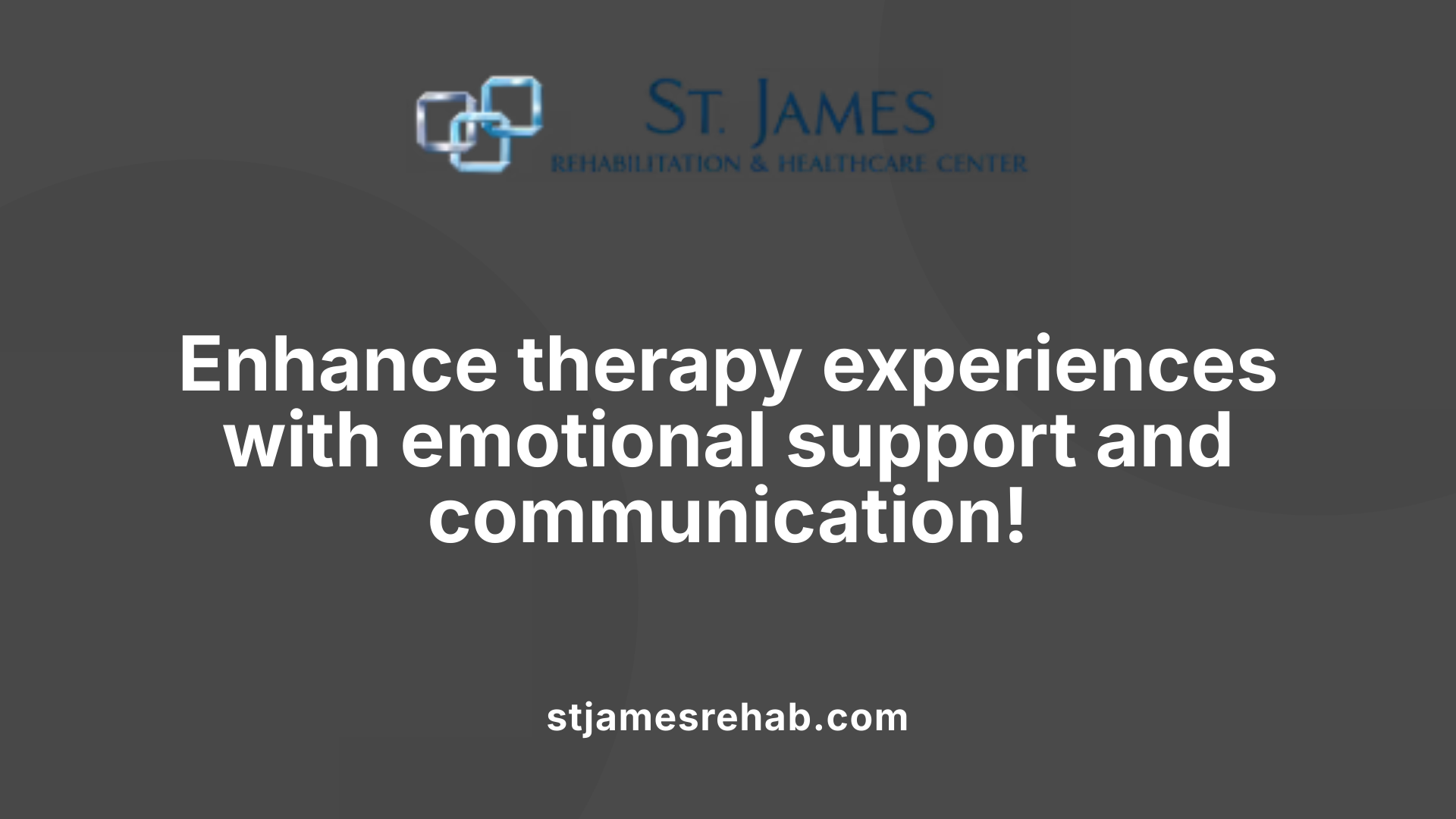How to Encourage Seniors to Attend Outpatient Therapy Sessions
Strategies to Bolster Senior Participation in Outpatient Therapy

Engaging Seniors in Their Rehabilitation Journey
Encouraging seniors to actively engage in outpatient therapy is crucial for enhancing their overall well-being, promoting independence, and improving their quality of life. Outpatient therapy provides seniors with the flexibility to undergo tailored rehabilitation while remaining in the comfort of their familiar environments. However, motivating seniors to attend these crucial sessions requires understanding their unique needs, interests, and the challenges they face. This article explores effective strategies, the role of emotional support, and the importance of clear communication in motivating seniors to participate consistently in outpatient therapy.
Personalized Approaches to Engage Seniors in Therapy

Encouraging participation in therapies based on seniors' interests and hobbies
Engaging seniors in activities that reflect their past interests can significantly enhance their participation in therapies. For instance, rekindling hobbies such as painting not only brings joy but also improves hand-eye coordination, thus motivating seniors to engage in therapeutic sessions. It’s important to recognize what seniors enjoy and incorporate those activities into their rehabilitation plans.
Moreover, finding creative ways to include seniors' interests—like music or journaling—can also promote mental engagement. Activities like solving puzzles can stimulate cognitive function and encourage attendance in therapy sessions. Creating a supportive framework allows seniors to explore these interests in a therapeutic setting.
Incorporating social elements into therapy to boost engagement
Social connections play a vital role in motivating seniors to attend therapy. Community events, like volunteering for Thanksgiving preparations, can give a sense of purpose and improve self-esteem. Encouraging family involvement not only reduces feelings of loneliness but can also increase motivation. When family members participate in therapy sessions, they provide essential support and advocacy, making the environment more comfortable.
Additionally, transforming therapy into a social gathering by including friends or forming support groups can create a welcoming atmosphere. This sense of community fosters engagement and encourages seniors to regularly attend their outpatient sessions. Overall, both personalized interests and social elements are essential components in enhancing the therapy experience for seniors.
Overcoming Barriers to Therapy Attendance

How can caregivers and family members support seniors in overcoming barriers to therapy attendance?
Caregivers and family members play a critical role in helping seniors navigate the challenges they face when attending therapy sessions. One effective strategy is to set realistic rehabilitation goals tailored to the individual's previous capabilities. Celebrating small victories can boost motivation and reinforce a sense of achievement, helping seniors remain engaged in their therapy.
It's important for caregivers to maintain a long-term perspective, understanding that recovery often takes time. This helps manage expectations and reduces frustrations when progress is not immediately visible.
Emotional support is equally crucial. Caregivers should be patient and empathetic, recognizing that dependency during recovery can be distressing for seniors. Exploring professional assistance, such as hiring geriatric caseworkers or engaging in activities at senior centers, can provide additional support and companionship for seniors, making therapy attendance feel less daunting.
Furthermore, caregivers need to prioritize their own wellness. Awareness of burnout is essential, as it ensures they can offer consistent and compassionate support without compromising their health. Building a support network for themselves can enhance their ability to assist seniors effectively.
Addressing logistical and emotional barriers to therapy attendance
Logistical issues often impede seniors from attending therapy sessions. Transportation can be a significant barrier; thus, caregivers should explore options for arranging reliable transport, whether via family members, taxis, or community services.
Communication also plays a vital role in addressing emotional barriers. Caregivers should help seniors understand the importance of their therapy and assist in alleviating fears related to pain or feelings of being a burden. Clear discussions about therapy's necessity can foster compliance and motivate seniors.
Creating an inviting environment at home can further ease stress and anxiety associated with therapy attendance. Simple actions like preparing for appointments together or providing reassurance can significantly impact seniors’ willingness to engage in their treatment plans.
The Critical Role of Emotional Support and Clear Communication

Why are emotional support and communication important in senior therapy experiences?
Emotional support and effective communication play a crucial role in enhancing the therapy experiences of seniors. When seniors feel valued and understood, their trust in the therapeutic process increases. This feeling of support alleviates anxiety and fear associated with therapy, allowing them to engage more willingly in their treatment.
Clear communication can demystify the therapy process. It helps to convey what seniors can expect, the benefits of participation, and how each session contributes to their overall health. Activities that require cognitive engagement, such as puzzles and games, can also improve emotional health, thereby fostering a stronger connection between seniors and their caregivers or therapists. This reinforces the importance of building meaningful relationships to elevate overall therapy outcomes and improve quality of life.
Strategies for improving communication with seniors
Improving communication with seniors involves several strategies:
- Use plain language: Avoiding complex medical jargon helps ensure the senior understands their health issues and the importance of attending therapy sessions.
- Be patient: Take time to listen and avoid rapid questioning, encouraging seniors to share vital information about their health status.
- Incorporate family members: Involving family in discussions can facilitate understanding and emotional support, lowering barriers to attendance.
- Provide clear written materials: Summarizing key points of discussion in written format reinforces understanding and ensures they retain important information regarding their treatment.
- Create a welcoming environment: An inviting atmosphere can lower anxiety levels, making attendees more comfortable.
These strategies not only enhance the therapy experience for seniors but also contribute to improved outcomes.
Exploring the Benefits of Outpatient Rehabilitation

What are the benefits of outpatient rehabilitation for seniors?
Outpatient rehabilitation offers a range of advantages uniquely suited to seniors. Primarily, it allows them to receive tailored exercises and therapies that significantly improve mobility, strength, and overall health. This personalized approach fosters a sense of independence since seniors can remain in the comfort of their own home or familiar community.
Another highlight is the flexibility of scheduling appointments, making it easier for seniors to fit therapy sessions into their daily routines. This can reduce the stress often associated with rigid inpatient care schedules.
Financially, outpatient rehabilitation tends to be more cost-effective. Seniors generally pay only for the services they utilize, avoiding the additional expenses typically found in inpatient facilities. This makes outpatient rehab an appealing option for many families.
Importantly, emotional support plays a crucial role in the rehabilitation journey. Engaging family members in the process not only enhances motivation but also provides essential encouragement. Celebrating small victories during recovery can uplift seniors, reinforcing their mental resilience as they adjust to new limitations.
Incorporating geriatric caseworkers into the equation can further enhance the experience by helping seniors navigate supportive care options and community resources tailored specifically for their needs.
Ultimately, outpatient rehabilitation can significantly enhance the quality of life for seniors, promoting both their physical restoration and emotional well-being.
| Benefits | Impact on Seniors | Considerations |
|---|---|---|
| Tailored exercises and therapies | Improved mobility and strength | Requires commitment to regular attendance |
| Flexible scheduling | Easier integration into daily routines | May require family support for transportation |
| Cost-effectiveness | Lower financial burden compared to inpatient care | Access to adequate support is critical for success |
| Emotional support from family | Increased motivation and resilience | Family involvement can enhance feelings of worth |
Goal Setting: A Pillar of Effective Rehabilitation
How does setting realistic goals with seniors contribute to the rehabilitation process?
Setting realistic goals with seniors is essential for a successful rehabilitation journey. Tailoring targets to individual capabilities fosters a sense of ownership and engagement among seniors. This personalized approach not only helps manage expectations but also aligns recovery objectives with the patient’s previous level of function.
Celebrating small victories is crucial, as it motivates seniors and reinforces their progress. For instance, achieving a simple milestone, like completing a set of exercises, can boost confidence and lead to greater willingness to participate in therapy.
Emotional support plays a vital role in this process. Caregivers can address mental health aspects and help seniors navigate challenges they encounter. By balancing encouragement with the need for independence, caregivers create an environment that enhances the effectiveness of rehabilitation.
SMART Goals Framework for Seniors
Using the SMART goals framework can further enhance the rehabilitation efforts:
- Specific: Goals should be clear and well-defined.
- Measurable: Progress should be trackable through regular evaluations.
- Achievable: Goals should be realistic, considering the senior’s health and capabilities.
- Relevant: Objectives should be meaningful to the individual’s life.
- Time-bound: Establishing a timeline for each goal aids in maintaining focus.
Additionally, achieving a balance between short-term and long-term goals helps build confidence. As seniors engage in rehabilitation, integrating lifestyle changes like improved nutrition and social engagement can further support their overall health and success in recovery.
Incorporating Technology in Senior Rehabilitation
Role of Telehealth in Maintaining Therapy Attendance
Telehealth has emerged as a vital resource in enhancing accessibility to rehabilitation services for seniors. By allowing remote consultations with healthcare providers, telehealth minimizes the need for travel, which can be a significant hurdle for many older adults. This convenience helps ensure that seniors can attend their therapy sessions consistently, even when mobility issues arise or transportation options are limited.
Benefits of Technology in Easing Communication and Access
Utilizing technology can significantly improve communication between seniors and their healthcare teams. Simple solutions such as video calls and mobile applications help seniors understand their treatment plans. Furthermore, technology fosters a sense of connection, keeping older patients engaged in their rehabilitation process. For example:
| Technology Type | Benefits | Example Use Case |
|---|---|---|
| Telehealth Services | Eliminates transportation barriers | Virtual therapy sessions |
| Health Monitoring Apps | Allows for tracking of progress | Daily exercise reminders |
| Communication Platforms | Facilitates discussions with family | Video chats for emotional support |
| Reminders for Appointments | Helps seniors manage their schedules | Alerts for therapy sessions |
Incorporating these technological innovations not only simplifies the rehabilitation journey but also encourages seniors to take an active role in their treatment, ultimately leading to improved health outcomes.
Creating a Supportive Home Environment
Adaptations to Facilitate Therapy Attendance at Home
Creating an accommodating home environment is essential for seniors in therapy. One effective adaptation is ensuring accessibility, such as installing grab bars in key areas like bathrooms and hallways. This not only enhances safety but also encourages seniors to participate more actively in their recovery.
Additionally, decluttering spaces makes it easier for seniors to move around, reducing the risk of accidents. Setting aside a dedicated area for exercises can provide a comfortable space for rehabilitation activities at home.
Involving Family in Post-Rehabilitation Activities
Family engagement plays a pivotal role in a senior's recovery journey. Regular visits and active participation in daily activities can significantly alleviate feelings of loneliness.
Family members can assist in setting achievable rehabilitation goals and celebrate progress, no matter how minor. Engaging in fun activities together, such as cooking or gardening, can not only motivate seniors but also promote overall mental well-being.
Creating a routine that includes family involvement in therapy not only reinforces support structures but also enhances the overall rehabilitation experience for seniors.
Enhancing Motivation Through Recognizing Achievements

Celebrating small wins in therapy
Recognizing achievements, no matter how small, plays a vital role in enhancing motivation for seniors in therapy. By shining a light on every progress, such as successfully completing an exercise or participating in a group activity, seniors feel a sense of accomplishment. This celebration of victories fosters a positive attitude towards therapy, helping them to stay engaged.
For instance, if a senior improves their hand-eye coordination through activities like painting, they can be encouraged further by noting their progress. Acknowledging these milestones not only reinforces their efforts but also boosts their self-esteem and willingness to continue.
Strategies to keep seniors motivated over time
Maintaining motivation over time can be challenging. Here are effective strategies:
- Set realistic goals: Utilize the SMART criteria (Specific, Measurable, Achievable) to establish clear objectives that seniors can relate to, making them feel invested in their recovery.
- Involve family: Engaging family members during therapy sessions can provide emotional support, accountability, and encouragement.
- Diversify activities: Incorporating various engaging activities, such as singing, journaling, or solving puzzles, can keep therapy sessions interesting and stimulate cognitive function.
By creating a nurturing environment where seniors feel appreciated and supported, their motivation to continue participating in therapy is significantly enhanced.
| Strategy | Description | Expected Outcome |
|---|---|---|
| Celebrate small wins | Recognize and praise small achievements | Increased self-esteem and motivation |
| Set realistic goals | Use SMART criteria for goal-setting | Clear direction and achievable objectives |
| Involve family | Encourage family participation in therapy | Enhanced emotional support and accountability |
Empowering Seniors Through Supportive Therapy Participation
Encouraging seniors to attend outpatient therapy sessions requires a compassionate, personalized approach that recognizes their unique challenges and caters to their individual interests. By providing emotional support, setting realistic goals, and effectively communicating the benefits of therapy, caregivers and family members can play a vital role in enhancing seniors' engagement in their rehabilitation journeys. Emphasizing flexibility, promoting independence through outpatient services, and leveraging technology all contribute to creating an environment where seniors feel supported and motivated to improve their health and quality of life. With the right strategies in place, seniors can confidently navigate the road to recovery, leading to a more fulfilling and independent life.
References
- How to Motivate Seniors to Participate in Activities
- Long-Term Senior Rehab Guide: Duration, Tips & Strategies
- Understanding Outpatient Rehab for Seniors
- Talking With Your Older Patients | National Institute on Aging
- 8 Activities to Boost Mental Health for Seniors - Oceans Healthcare
- Psychotherapy and older adults resource guide
- Outpatient Rehabilitation Options for Seniors | HBRHC





